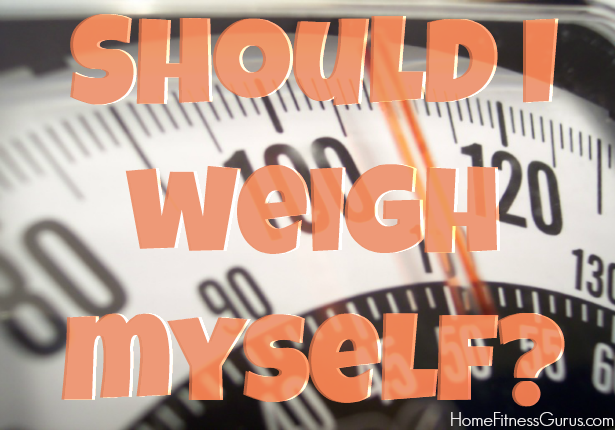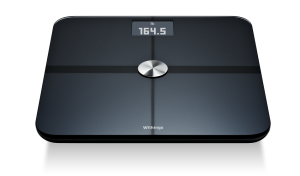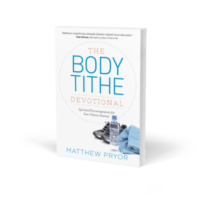
If you’re wondering, “Should I weigh myself?” the answer may not be a simple “yes” or “no.” Let’s take a look at both sides of the argument.
Before deciding, “Should I weigh myself?”
Before deciding “Should I weigh myself?” it’s important to understand that trimming down should be about shedding fat, NOT about losing weight. There are two key differences:
1) Fat matters, weight does not. Repeat after me: “Fat matters, weight does not.” When you are measuring total weight rather than body fat percentage, gaining muscle (which is a good thing, even though it weighs more than fat) will move the bathroom scale in the wrong direction in your mind.
But say you’ve reached your goal figure, clothes now fit the way you’ve always wanted, you have a renewed confidence, and energy is at an all-time high… does it really matter if the scale says you weigh 12 pounds more than you thought you would to have such a figure? No, it doesn’t. IT IS COMPLETELY IRRELEVANT.
I know this is a hard one, especially for ladies who tend to focus on the scale. But the sooner you reorient your thinking, the sooner you’ll start making real and long-lasting changes that will move you closer and closer to your goal.
2) When is losing ever a good thing? Typically it means that either another team won or you can’t find something that is important to you. I can’t remember ever losing a belonging and being happy about it. So why then characterize a fitness goal as wanting to “lose weight” unless you’re hoping to get it back. This is a subtle but important distinction. Reorient your thinking and aim to “shed fat” instead. You don’t want to give yourself any recourse to go back to your former self, be it physical (for example, get rid of your old clothes that now don’t fit) or in this case, emotional/psychological. Adopting a mindset of permanence is essential in establishing lifestyle changes.
Okay, now that you’re up to speed, you can look at the pros and cons of whether you should weigh yourself.
Should I weigh myself? Pros.
- Sometimes, the mirror is a hard way to track your weight loss progress. Depending on the lighting, what we’ve eaten that day, or what kind of mood we’re in, the mirror may suggest no progress when in fact there has been some (or vice versa). However, weighing yourself can be a good objective way to track your overall weight. And if your scale measures body fat, all the better. Pro: objective
- Weighing yourself is easy. Step on the scale and look down. Do this every morning, first thing, either naked or in your undergarments. Make a note of it and make comparisons over time. Pro: easy
- Assuming your scale shows body fat percentage, using it gives you a great baseline for progress. Sometimes our repetitions in the gym or mileage on the road don’t appear to be changing much. But if you have a baseline from your scale to measure some body compensation changes, it’s yet another metric you can use as an indicator if you’re plan is working. Pro: baseline indicator
Should I weigh myself? Cons.
If you’re the kind to get easily discouraged, weighing yourself might be a mistake. Your weight (and body fat composition) fluctuate daily. If seeing the scale go up one morning is likely going to send you into a downward spiral for the rest of your day, the answer to “Should I weigh myself?” is “No.” Con: could discourage easily
Even with a scale as nice as the Withings Wi-Fi Scale, body fat percentage will not be super precise. Scales use bioelectrical impedance to measure water in your body, which is then used to measure fat, and by deduction, muscle. What this means is that if you’re over-hydrated or dehydrated, your body fat will be reported lower or higher. So while it will still give you a baseline (if you’re always using the same scale at the same time of day wearing the same thing) it won’t be super precise. This technology has improved over the years, but it’s not as reliable as body calipers or underwater weighing. Con: imprecise
If you don’t own the fact that body fat matters and weight does not, weighing yourself is simply not helpful (unless you’re looking to do a mass gainer like Body Beast, and even still, you’d want to know body fat percentage). You will be attempting to measure an irrelevant number that may or may not be providing an indicator of progress. Con: not helpful with the wrong mindsetShould I weigh myself? Conclusion.
Ultimately, how you answer the question “Should I weigh myself?” is one only you can answer. Personally, I am a huge fan of it. It gives me daily accountability (arguably another pro). It’s yet another metric I can use in combination with heart rate monitoring, repetitions and weights lifted, mileage ran, time spent exercising, blood pressure monitoring, and so on. These give me a good overall picture of my fitness level.
Then again, I’m not easily discouraged and I own the fact that fat matters and weight does not. My suggestion for you would be to take an honest look at yourself and tally the pros and cons for your situation. If it’s a tool that will help you, great. If not, don’t worry about it… far too many people do.
After you’ve made a decision, stick with it, be consistent, and follow your plan. No matter how good your tools are, they don’t get the results. Following your plan consistently does.
SIDENOTE: Should I weigh myself? If “yes,” use this scale!
 If you decide you’re in favor of weighing yourself, I can’t recommend the Withings Wi-Fi Scale (seen at left) highly enough. If Apple made a scale, this would be it. It measures weight, body fat, and BMI, and records them, for multiple users, without you having to tell it who is who. It records the data over wi-fi so you can chart it over time (see my charts from the Ultimate Rest Review). There’s also a free app for your smartphone so you can look them up when away from a computer. Furthermore, if you really want to up the accountability, you can have it automatically share your numbers with Facebook and Twitter, your doctor, even other fitness apps. It is to scales what PB2 is to peanut butter… it’s the future.
If you decide you’re in favor of weighing yourself, I can’t recommend the Withings Wi-Fi Scale (seen at left) highly enough. If Apple made a scale, this would be it. It measures weight, body fat, and BMI, and records them, for multiple users, without you having to tell it who is who. It records the data over wi-fi so you can chart it over time (see my charts from the Ultimate Rest Review). There’s also a free app for your smartphone so you can look them up when away from a computer. Furthermore, if you really want to up the accountability, you can have it automatically share your numbers with Facebook and Twitter, your doctor, even other fitness apps. It is to scales what PB2 is to peanut butter… it’s the future.

